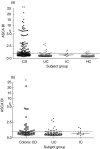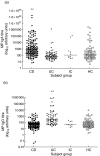Anti-Saccharomyces cerevisiae antibodies (ASCA) in Crohn's disease are associated with disease severity but not NOD2/CARD15 mutations
- PMID: 15008984
- PMCID: PMC1808965
- DOI: 10.1111/j.1365-2249.2003.02392.x
Anti-Saccharomyces cerevisiae antibodies (ASCA) in Crohn's disease are associated with disease severity but not NOD2/CARD15 mutations
Abstract
Anti-Saccharomyces cerevisiae antibodies (ASCAs) have been proposed as serological markers, which may differentiate Crohn's disease (CD) from ulcerative colitis (UC) and predict disease phenotype. Their importance in pathogenesis is unproven. We investigated the relationship between ASCAs, disease phenotype and NOD2/CARD15 genotype in CD and whether ASCAs were related to antibodies to other fungal proteins. Serum from 228 patients [143 CD, 75 UC, 10 with indeterminate colitis (IC)] and 78 healthy controls (HC) were assayed for ASCA. Antibodies (IgA, IgG) to other fungal proteins (Fusarium species ATC20334, Mycoprotein) were measured in the same samples using an in-house enzyme-linked immunosorbent assay (ELISA) assay. ASCAs were present in 57% of CD, 19% of UC, 30% of IC and 8% of HCs. ASCA-positive status was a predictor for CD with sensitivity of 57%, specificity of 87%, positive predictive value of 78% and negative predictive value of 68%. ASCA was associated with proximal (gastroduodenal and small bowel involvement) rather than purely colonic disease (P < 0.001) and with a more severe disease phenotype and requirement for surgery over a median follow-up time of 9 years (P < 0.0001). No associations with NOD2/CARD15 mutations were seen. There was no association between ASCA and antibodies to MP (IgA or IgG). These data implicate ASCA as a specific marker of disease location and progression in CD, emphasizing the heterogeneity within IBD.
Figures


Similar articles
-
Seroreactivity to microbial components in Crohn's disease is associated with ileal involvement, noninflammatory disease behavior and NOD2/CARD15 genotype, but not with risk for surgery in a Hungarian cohort of IBD patients.Inflamm Bowel Dis. 2007 Aug;13(8):984-92. doi: 10.1002/ibd.20146. Inflamm Bowel Dis. 2007. PMID: 17417801
-
New serological markers for inflammatory bowel disease are associated with earlier age at onset, complicated disease behavior, risk for surgery, and NOD2/CARD15 genotype in a Hungarian IBD cohort.Am J Gastroenterol. 2008 Mar;103(3):665-81. doi: 10.1111/j.1572-0241.2007.01652.x. Epub 2007 Nov 28. Am J Gastroenterol. 2008. PMID: 18047543
-
CARD15 polymorphisms are associated with anti-Saccharomyces cerevisiae antibodies in caucasian Crohn's disease patients.Clin Exp Immunol. 2005 May;140(2):354-9. doi: 10.1111/j.1365-2249.2005.02759.x. Clin Exp Immunol. 2005. PMID: 15807862 Free PMC article.
-
HLA-DRB1 alleles may influence disease phenotype in patients with inflammatory bowel disease: a critical reappraisal with review of the literature.Dis Colon Rectum. 2005 Jan;48(1):57-64; discussion 64-5. doi: 10.1007/s10350-004-0747-0. Dis Colon Rectum. 2005. PMID: 15690658 Review.
-
From ASCA breakthrough in Crohn's disease and Candida albicans research to thirty years of investigations about their meaning in human health.Autoimmun Rev. 2024 Feb;23(2):103486. doi: 10.1016/j.autrev.2023.103486. Epub 2023 Nov 30. Autoimmun Rev. 2024. PMID: 38040100 Review.
Cited by
-
Current and future role of biomarkers in Crohn's disease risk assessment and treatment.Clin Exp Gastroenterol. 2011;4:127-40. doi: 10.2147/CEG.S18187. Epub 2011 Jun 2. Clin Exp Gastroenterol. 2011. PMID: 21753895 Free PMC article.
-
Fungal feelings in the irritable bowel syndrome: the intestinal mycobiome and abdominal pain.Gut Microbes. 2023 Jan-Dec;15(1):2168992. doi: 10.1080/19490976.2023.2168992. Gut Microbes. 2023. PMID: 36723172 Free PMC article. Review.
-
Current understanding of fungal microflora in inflammatory bowel disease pathogenesis.Inflamm Bowel Dis. 2008 Aug;14(8):1147-53. doi: 10.1002/ibd.20402. Inflamm Bowel Dis. 2008. PMID: 18286647 Free PMC article. Review.
-
MICROBIOTA INSIGHTS IN CLOSTRIDIUM DIFFICILE INFECTION AND INFLAMMATORY BOWEL DISEASE.Gut Microbes. 2020 Nov 9;12(1):1725220. doi: 10.1080/19490976.2020.1725220. Epub 2020 Mar 4. Gut Microbes. 2020. PMID: 32129694 Free PMC article. Review.
-
The yin and yang of B cells in a constant state of battle: intestinal inflammation and inflammatory bowel disease.Front Immunol. 2023 Oct 2;14:1260266. doi: 10.3389/fimmu.2023.1260266. eCollection 2023. Front Immunol. 2023. PMID: 37849749 Free PMC article. Review.
References
-
- Rubin GP, Hungin AP, Kelly PJ, Ling J. Inflammatory bowel disease: epidemiology and management in an English general practice population. Aliment Pharmacol Ther. 2000;14:1553–9. - PubMed
-
- Lennard-Jones JE. Classification of inflammatory bowel disease. Scand J Gastroenterol. 1989;24(Suppl.):2–6. - PubMed
-
- Joossens S, Reinisch W, Vermeire S, et al. The value of serologic markers in indeterminate colitis: a prospective follow-up study. Gastroenterology. 2002;122:1242–7. - PubMed
-
- Shanahan F. Crohn's disease. Lancet. 2002;359:62–9. - PubMed
-
- Blumberg RS, Saubermann LJ, Strober W. Animal models of mucosal inflammation and their relation to human inflammatory bowel disease. Curr Opin Immunol. 1999;11:648–56. - PubMed
MeSH terms
Substances
LinkOut - more resources
Full Text Sources
Other Literature Sources
Medical
Miscellaneous

